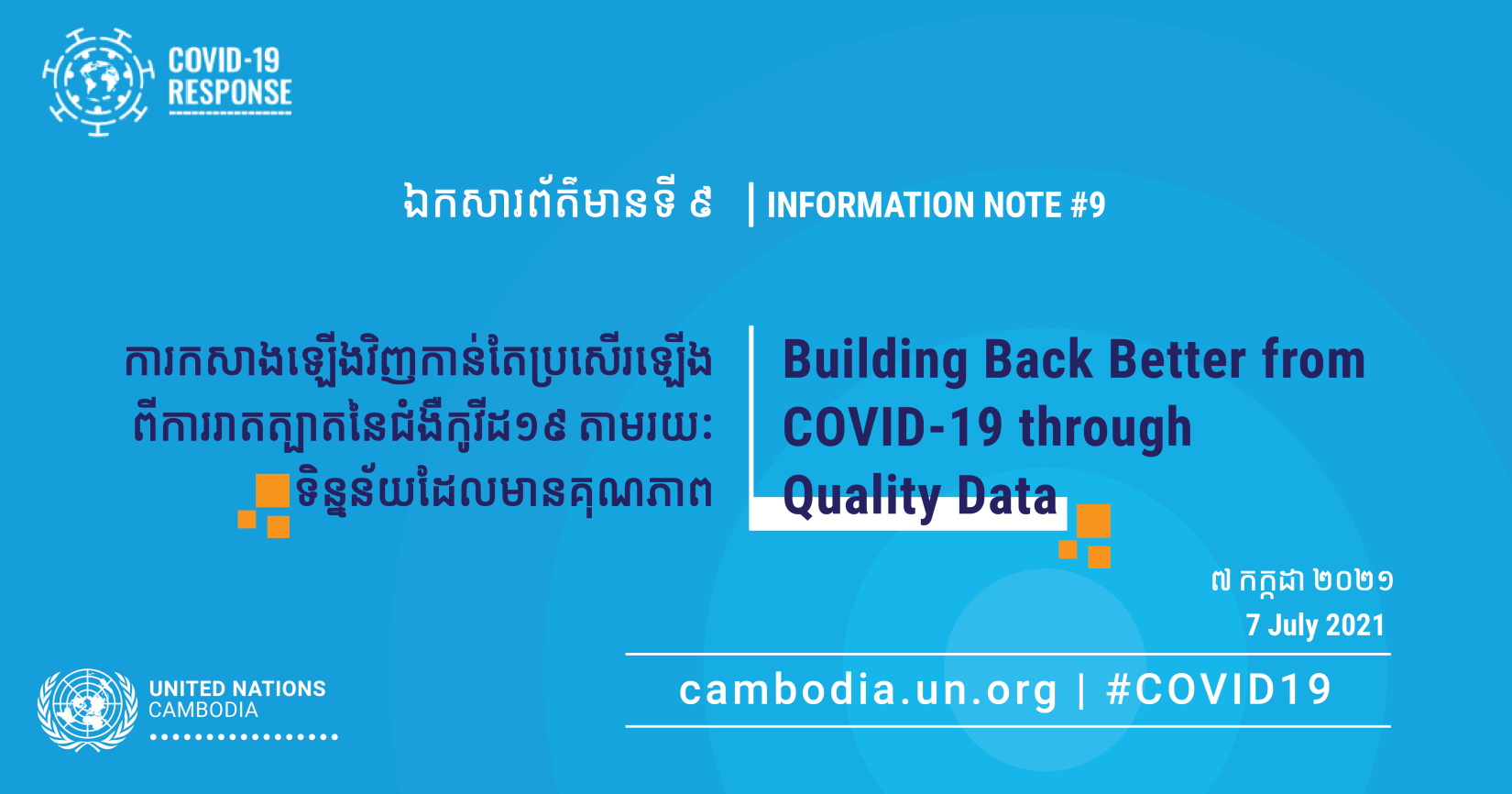Information Note #9: Building Back Better from COVID-19 through Quality Data
07 July 2021

Timely and reliable disaggregated data and official statistics are critical for understanding, managing, and mitigating the health, social and economic impacts of the COVID-19 pandemic. They are also essential for designing effective, evidence-based responses to the crisis and to drive an inclusive and sustainable recovery, that leaves no one behind. While data is critical for policymaking in ‘normal times’, the pandemic has served to further elevate the importance of data to save lives and to recover better.
Cambodia has made progress in increasing the availability of data, however significant data gaps exist, including in the level of disaggregation required, geographical coverage and timeliness.[1] The United Nations has prioritised assistance to the Royal Government of Cambodia to improve the quality, accessibility and disaggregation of data and statistics. The United Nations is working to strengthen national capacity to enable this and is contributing to the production of reliable data that is needed to respond to the challenges posed by the pandemic. Assistance also centres on improving national capacity for the monitoring of the Sustainable Development Goals (SDGs) and other national indicators to foster achievement of the 2030 Agenda.
In line with this, the United Nations is supporting the Ministry of Planning and the National Institute of Statistics, as well as line Ministries to improve the availability and utilization of data for sustainable development including to better link data to planning and budgeting processes. The focus has been on providing support for the implementation and roll out of the National Strategy for the Development of Statistics (NSDS) to enhance statistical systems in line with international standards. The United Nations is also supporting the collection of key statistical data through national census, demographic, social and economic surveys, and administrative data systems that will provide quality data for use in monitoring national development frameworks and to guide policy direction. This incorporates support for the Government’s SDG monitoring and reporting along with the setup of the National Development/SDGs Indicators Reporting and Data Exchange among Government line ministries through the National Platform - CAMSTAT which includes a CSDG/SDG tracking portal. In the current context of the pandemic, reliable data will be essential to support SDG acceleration efforts to enable Cambodia to remain on track to achieve the SDGs.
The United Nations has carried out a series of rapid assessments and surveys, together with its partners to collect data to better understand the varied impacts of the COVID-19 pandemic on health, society and the economy especially for vulnerable groups. This has included impact assessments and surveys to glean data on the impact of the pandemic on children, women, youth, people with disabilities, people living with HIV/AIDS, sexual reproductive health, returning migrants, garment workers, informal workers, as well as on small and medium enterprises. Many of the surveys have been undertaken in several rounds and intervals and have contributed to informing government policymaking and programme adjustment to better respond to the evolving COVID 19 situation.
The United Nations is also contributing quality data through regular household-based data collection to measure the evolution of food security and nutrition and the effectiveness of mitigation measures in Cambodia. The United Nations carries out remote price and market monitoring in cooperation with the Agricultural Marketing Office (AMO) of the Ministry of Agriculture, Forestry and Fisheries (MAFF) and produces monthly monitoring reports (Cambodia Market Update) that provide data and insights on price trends, market functionality and supply chains, agricultural production to understand prevailing market conditions and the implications for households in Cambodia and Government policy responses. The United Nations collects monthly agricultural production data on Cambodia to provide early warning through the Global Information and Early Warning System. This monitoring continues through the COVID-19 pandemic and gives a snapshot of the Earth Observation Indicators targeting seasonal indicators, vegetation indicators, and precipitation indicators.
The United Nations agency - World Health Organisation (WHO) and the Ministry of Health of Cambodia prepare regular COVID-19 situation reports to highlight the most recent developments in the health response to COVID-19. Since the outbreak of the pandemic, the United Nations has also supported the Royal Government to track the number of Cambodian returning migrants and the situation at borders and in quarantine to inform more effective policy responses. The United Nations is also working on shock responsive social assistance connecting IDPoor data, with the social protection system and the national disaster management system. Support has also been provided for a range of information management systems such as the Child Protection Information Management System; and Platform for Real-time Impact and Situation Monitoring (PRISM).
The United Nations worked with the Ministry of Economy and Finance (MEF) to build some of the first models able to estimate COVID19’s social and economic impact. This work showed how stimulus packages that included social protection not only improve GDP but significantly reduce poverty and unemployment. Further work revealed how reduced access to education due to pandemic conditions caused a reduction in Cambodia’s Human Development Index.
To promote wide access to data, the United Nations hosts a public Reports Dashboard, which contains the latest published and upcoming research and assessments on Cambodia, drawn from various partners. This includes research on the impacts of COVID 19. As of 5 July 2021, 168 completed and ongoing assessments were included in the dashboard. The dashboard provides visualizations and simple analytics of reports. It helps to assess and identify knowledge gaps; create benchmarks to track progress in line with the 2030 Agenda for Sustainable Development.
The COVID-19 pandemic highlighted challenges and vulnerabilities in data production and systems. The Royal Government of Cambodia, with support from its partners, has made efforts to generate data and evidence to inform policy decision and programme adjustments. In this light, the United Nations encourages the authorities to continue its efforts to strengthen national data and statistical systems to ensure that data can better contribute to leaving no one behind and to fostering equality and sustainable development. To effectively do this, data production systems must respond more effectively and quickly to the changing environment and better anticipate risks. The United Nations encourages better use of digital technologies, innovation, and new data sources to provide more timely data. The United Nations also encourages the authorities to promote greater data literacy and data governance. Highlighting the crucial role data plays in the pandemic response, the United Nations urges the authorities to ensure a balance between protecting public health and the right to privacy. Adequate data privacy and protection of personal information are achieved through appropriate legal and policy measures. At the same time balancing and respecting the importance of ensuring transparency and accessibility to data that is in the public interest is crucial. It is important to adopt a holistic and whole-of-government approach to data governance with the engagement of all stakeholders and partners across sectors. Greater effort is required to overcome data silos and priority should be placed on enhancing the capacity for the collection of disaggregated data to ensure the inclusion of vulnerable groups that are most impacted by the pandemic.
The United Nations will continue to partner with the Royal Government and other partners to improve the availability, timeliness and utilization of quality data and statistics necessary to respond to the pandemic, future crisis and to accelerate action to achieve the Sustainable Development Goals.
UN Cambodia’s Response to COVID-19 Information Notes are official documents from the United Nations in Cambodia intended for the media and other partners. They are prepared by the Office of the UN Resident Coordinator.
[1] More information can be found in the Cambodia’s Voluntary National Review 2019 https://www.kh.undp.org/content/cambodia/en/home/library/environment_energy/cambodia_s-voluntary-national-review-2019.html








